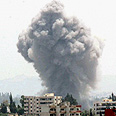
Bombs on Beiruy
Photo: Reuters
The generals have spoken. In fact almost all the generals, past (certainly), present and future. But I’m not convinced.
Yes, we have every right to respond to an incursion across our internationally recognized border, especially since we totally withdrew from Lebanon six years ago. And yes, we have every right to respond to Qassam attacks upon civilians in the south.
But what is important, first of all, is how one responds. The two cases are different: Lebanon is a sovereign state; the Palestinian Authority is anything but sovereign. The attack from Lebanon was totally unprovoked; the Qassams are part of the occupation’s cycle of violence, targeted killings and the like.
Collective punishment
But in both cases the response (and counter-response) has been collective punishment against civilian populations. In both cases the purpose appears to be (and has been stated by many of the ex-military commentators to whom we have been subjected) to inflict sufficient punishment upon the local population to the point of bringing them to pressure their governments to do what we want them to do.
In the case of Gaza: the goal is to clamp down on the militant Qassam launchers – and possibly also to throw out the Hamas government. In Lebanon, it is to get the Lebanese army to deploy in the south, in order to eject or disarm Hizbullah.
But could these objectives be achieved any other way? Can they be achieved by the way we are currently responding? What purpose does our response really serve?
Crossing the line
Currently, the response addresses the frustration and indignation of the Israeli public, especially those under fire; it also addresses the tarnished pride of the IDF (and perhaps of the government) under the guise of restoring our lost deterrence credibility (which hasn’t worked for many years, possibly decades, if ever. Somehow the Arabs never seem to learn that it does not pay to attack us).
But the massive use of Israeli power has probably already crossed the line not only of what might be justified but also of efficacy. The bombing of Lebanon’s infrastructure, the demolition of parts of Beirut and other cities, never mind the destruction of most of the south, and the killing of over 200 mainly civilian Lebanese, have done little to strengthen the Christian and Sunni opposition to Hizbullah.
Lebanese anger has been turned against the attackers, Israel, and solidarity has at least temporarily replaced traditional confessional hostilities. In Gaza, the moderate voices of Mahmoud Abbas' supporters and those Hamas elements who supported the national reconciliation program of the prisoners’ document, have certainly been silenced by Israeli tanks and airplanes, to the advantage of the most militant elements of Hamas sitting in Damascus.
No military answer
Will this bring about a release of the Israeli soldiers? Will it stop the Qassams from Gaza or the occasional (in the past) attacks from southern Lebanon?
Again, current and former generals tell us that they realize that the answer is no. The Qassams continue, and will return even if temporarily stopped. Hizbullah cannot be permanently destroyed.
In the case of the soldiers, and in the case of the armed attacks, only political solutions will bring about the desired results, if even they can. An exchange of prisoners, perhaps, and an international force to back up the Lebanese Army, perhaps. This is the most that can be expected – do we need to continue the bloodletting and suffering, on all sides to achieve these?
In whose interest?
Without asking if we needed to even begin this cycle of violence to achieve these, surely the question now is, "do we need to continue?" America may want us to continue to hit Iran and Syria’s proxies in Lebanon, but is that in Israel’s real interest?
Or is our interest better served by a cease-fire, a strong international presence, the beginning of a political process and possibly even agreement with Syria? That would stop Hizbullah far more effectively than we can.
Professor Galia Golan is a professor of Russian and East European Studies at Hebrew University and a long-time Peace Now activist















